A study of 540,000 people revealed that milk can prevent cancer

|
As the third most common cancer in the world, the incidence of colorectal cancer shows significant differences in different regions, with higher incidence in high-income countries and lower incidence in low-income regions. This phenomenon reminds us that lifestyle and environmental factors play an important role in the occurrence of colorectal cancer. In order to further explore the relationship between diet and colorectal cancer risk, Keren Papier's team at the University of Oxford in the UK conducted a large-scale prospective study to identify foods or nutrients associated with colorectal cancer risk and quantify their impact, providing a scientific basis for the prevention of colorectal cancer. Research Methods and Process This study is based on the rich data of the UK Million Women Study Cohort. 542,778 women with an average age of 59.7 were carefully selected as research subjects and followed up for 16.6 years. During this period, the research team recorded the health status of each participant in detail and eventually recorded 12,251 new cases of colorectal cancer. In order to further explore the relationship between diet and colorectal cancer risk, the researchers used a dietary questionnaire survey to collect detailed information about the participants' intake of 97 dietary factors. In terms of data analysis, the research team used the Cox proportional hazards regression model, which is a commonly used statistical method to evaluate the relative risk between each dietary factor and the risk of colorectal cancer. This method can quantify the relationship between changes in food or nutrient intake and the risk of colorectal cancer. To ensure the accuracy and reliability of the study results, the researchers also conducted sensitivity analysis and Mendelian randomization analysis. The purpose of sensitivity analysis is to exclude potential confounding factors that may interfere with the relationship between diet and colorectal cancer risk and lead to biased results; Mendelian randomization analysis is a more advanced method used to exclude the possibility of reverse causality, that is, to ensure that it is not colorectal cancer that affects the participants' dietary habits, but dietary habits that affect the risk of colorectal cancer. Through these comprehensive research methods, the research team was able to not only identify dietary factors that are significantly associated with colorectal cancer risk in the massive data, but also accurately quantify the extent to which these factors affect the risk. Such a research design not only ensures the scientific nature of the research, but also makes the results highly credible, providing a strong scientific basis for the prevention of colorectal cancer. Research findings and recommendations for preventing colorectal cancer 1. Alcohol is positively correlated with the risk of colorectal cancer: Studies have found that for every 20 g increase in daily alcohol intake, the risk of colorectal cancer increases by 15%. The acetaldehyde produced by alcohol may interfere with DNA repair function, increase the generation of reactive oxygen species, and damage colorectal tissue. 2. Red meat or processed meat is positively correlated with the risk of colorectal cancer: For every 30g increase in daily red meat or processed meat intake, the risk of colorectal cancer increases by 8%. This is related to the nitrosamine compounds contained in red meat or processed meat and carcinogens such as heterocyclic amines produced during high-temperature cooking. 3. Dairy products are negatively correlated with the risk of colorectal cancer: Dairy products do help prevent colorectal cancer, and this effect can be largely attributed to calcium intake. After adjusting for dairy product intake, calcium intake still significantly reduces the risk of colorectal cancer; however, after adjusting for calcium intake, the protective effect of dairy products is significantly weakened. Whether the calcium in the diet comes from dairy products or non-dairy products, there is no difference in its protective effect. 4. Calcium is negatively correlated with the risk of colorectal cancer: For every 300 mg increase in daily calcium intake, the risk of colorectal cancer decreases by 17%. Calcium may combine with bile acids and free fatty acids in the intestines, reducing the potential carcinogenic effects of these substances, while helping to reduce intestinal permeability and protect the intestinal mucosa. Based on the research results of the Oxford University team, the following are recommendations for preventing colorectal cancer: 1. Reduce alcohol intake: Given the significant positive correlation between alcohol and colorectal cancer risk, it is recommended to limit alcohol intake, especially for high-risk groups. 3. Increase calcium intake: Increasing calcium intake through diet or supplements can help prevent colorectal cancer. Dairy products are a good source of calcium, but you should also pay attention to the amount to avoid other health problems caused by excessive intake. 4. Balanced diet: Maintaining a diversified diet, increasing the intake of fruits, vegetables, and whole grains, and ensuring adequate fiber intake will help maintain intestinal health. 5. Lifestyle adjustments: In addition to diet, you should also pay attention to other lifestyle factors, such as quitting smoking, maintaining moderate exercise, maintaining a healthy weight, etc., to comprehensively reduce the risk of colorectal cancer. This in-depth study by the University of Oxford in the UK reveals the subtle relationship between diet and colorectal cancer risk, providing us with valuable scientific evidence. By rationally adjusting the dietary structure, increasing the intake of calcium-rich foods, and reducing the consumption of alcohol, red meat, and processed meat, we can effectively reduce the risk of colorectal cancer. Let us start from now on, practice the concept of healthy diet, build a solid line of defense for our intestinal health, and jointly protect the beauty and vitality of life. References: Papier, K., Bradbury, KE, Balkwill, A. et al. Diet-wide analyzes for risk of colorectal cancer: prospective study of 12 251 incident cases among 542 778 women in the UK. Nat Commun 16 375 (2025). https://doi.org/10.1038/s41467-024-55219-5 |
<<: Eat fruit before or after meals? It depends on the individual
Recommend
The difference between luteinization of follicles and ovulation
The main cause of female infertility is anovulati...
What is vaginal bleeding during sex and how to treat it
Many women experience vaginal bleeding after sexu...
Is it really possible to ride a bicycle during menstruation?
Generally, it is not recommended to do some stren...
What is Northeastern pickled cabbage made of? What temperature is needed to pickle Northeastern pickled cabbage?
Northeastern sauerkraut has the effects and funct...
[Fat Bear Science] These abnormalities on the legs may indicate cancer
The early symptoms of cancer in different systems...
What causes pain in the innermost part of the vagina?
The most common problem encountered nowadays is p...
TCM treatment of ovarian cysts, TCM treatment of diseases and
The main cause of ovarian cysts is the hormone le...
How to prevent the widening of the posterior horn of the right lateral ventricle in the fetus
We all know that when pregnant women do fetal fet...
What is the reason for the car to deviate from the road? Does the car need to be dynamically balanced when it deviates from the road?
We all drive straight, and few people deviate fro...
Is it better for cancer patients to be fatter or thinner?
Author: Wu Yinfan, Intermediate Nutritionist at F...
Does uterine prolapse generally cause infertility?
Many women find that their uterus is sagging, whi...
Can pregnant women sit in a massage chair?
Massage chairs can effectively relieve our fatigu...
Will boys flirt with beautiful girls when they see them? What is the mentality of strange men flirting with girls?
For girls, when they are approached on the street...
[Exercise Prescription] Exercise is the best medicine! How to exercise for 9 diseases?
Doctors prescribe drugs to patients, and everyone...
What are the effects of mobile phone radiation on pregnant women?
Small mobile phone, light and convenient. Especia...









